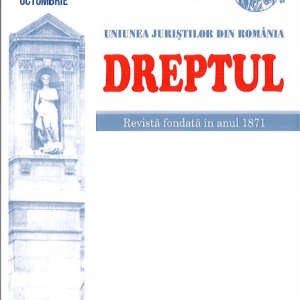-
 In this study, after a presentation regarding the establishment of the Commonwealth of Independent States (C.I.S.), in December 1991, the author examines: the legal personality of this international organization; its constituent bodies; the member states of the organization; CIS – present and prospects.
In this study, after a presentation regarding the establishment of the Commonwealth of Independent States (C.I.S.), in December 1991, the author examines: the legal personality of this international organization; its constituent bodies; the member states of the organization; CIS – present and prospects. -
 According to the regulations of the Romanian pension law, persons who, prior to 1 April 2001, worked in the work groups I and II benefit of a series of easements at the calculation of pension rights, as well as of the reduction of the standard retirement age. In this study, the author examines a rich and interesting case law of the classification into the work groups I and II – according to Orders no. 50/1990 and no. 125/1990 issued by the Minister of Labor and Social Protection, the Minister of Health and the President of the National Labor Protection Commission, with the mentioning that, under certain conditions, these Orders also apply to the persons retiring subsequent to 1 April 2001, but who carried out activities classified in the work groups I and II (according to the above-mentioned Orders) prior to such date.
According to the regulations of the Romanian pension law, persons who, prior to 1 April 2001, worked in the work groups I and II benefit of a series of easements at the calculation of pension rights, as well as of the reduction of the standard retirement age. In this study, the author examines a rich and interesting case law of the classification into the work groups I and II – according to Orders no. 50/1990 and no. 125/1990 issued by the Minister of Labor and Social Protection, the Minister of Health and the President of the National Labor Protection Commission, with the mentioning that, under certain conditions, these Orders also apply to the persons retiring subsequent to 1 April 2001, but who carried out activities classified in the work groups I and II (according to the above-mentioned Orders) prior to such date. -
 This study deals with the issue of forced distinctiveness, a legal mechanism that is essential for the matter of the trade mark law, but which is not generally thoroughly treated in the Romanian specialized literature, despite the rich case law it generates. Forced distinctiveness refers to the situation in which a sign that is likely to be represented graphically, but which initially lacks a distinctive nature, acquires distinctiveness following its use. Throughout the study, the author examines the legal nature of forced distinctiveness, from the point of view of the Romanian legislation and the European regulations, with references to the essential case law in this matter. Thus, in the first part, the author reviews the signs likely to acquire distinctiveness by use and in the second part, he examines the conditions of forced distinctiveness, as well as the criteria on which the assessment of the competent authority is based.
This study deals with the issue of forced distinctiveness, a legal mechanism that is essential for the matter of the trade mark law, but which is not generally thoroughly treated in the Romanian specialized literature, despite the rich case law it generates. Forced distinctiveness refers to the situation in which a sign that is likely to be represented graphically, but which initially lacks a distinctive nature, acquires distinctiveness following its use. Throughout the study, the author examines the legal nature of forced distinctiveness, from the point of view of the Romanian legislation and the European regulations, with references to the essential case law in this matter. Thus, in the first part, the author reviews the signs likely to acquire distinctiveness by use and in the second part, he examines the conditions of forced distinctiveness, as well as the criteria on which the assessment of the competent authority is based.
